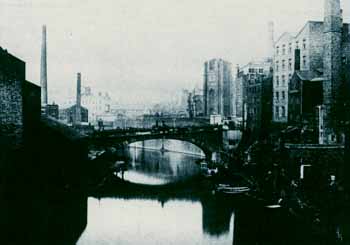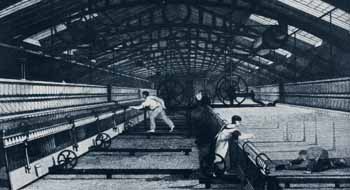|
- M a r y B a r t o n:
A T a l e o f
M a n c h e s t e r L i f e.
_____________________


Industrial Manchester
(Photograph by
James Mudd 1859)
Cotton Manufacture
(E. Baines, Cotton Manufacture
in Great Britain, 1835)
- 'Nimm nur, Fährmann, nimm die Miethe,
Die ich gerne dreifach biete .
Zween, die mit mir überfuhren,
Waren geistige Naturen.' *)
- P r e f a c e .
- THREE years ago I became anxious (from circumstances that need not be more fully alluded to) to employ myself in writing a work of fiction. Living in Manchester, but with a deep relish and fond admiration for the country, my first thought was to find a frame-work for my story in some rural scene; and I had already made a little progress in a tale, the period of which was more than a century ago, and the place on the borders of Yorkshire, when I bethought me how deep might be the romance in the lives of some of those who elbowed me daily in the busy streets of the town in which I resided. I had always felt a deep sympathy with the care-worn men, who looked as if doomed to struggle through their lives in strange alternations between work and want; tossed to and fro by circumstances, apparently in even a greater degree than other men. A little manifestation of this sympathy and a little attention to the expression of feelings on the part of some of the work-people with whom I was acquainted, had laid open to me the hearts of one or two of the more thoughtful among them; I saw that they were sore and irritable against the rich, the even tenor of whose seemingly happy lives appeared to increase the anguish caused by the lottery-like nature of their own. Whether the bitter complaints made by them, of the neglect which they experienced from the prosperous - especially from the masters whose fortunes they had helped to build up - were well-founded or no, it is not for me to judge. It is enough to say, that this belief of the injustice and unkindness which they endure from their fellow-creatures, taints what might be resignation to God's will, and turns it to revenge in too many of the poor uneducated factory-workers of Manchester.
The more I reflected on this unhappy state of things between those so bound to each other by common interests, as the employers and the employed must ever be, the more anxious I became to give some utterance to the agony which, from time to time, convulses this dumb people; the agony of suffering without the sympathy of the happy, or of erroneously believing that such is the case. If it be an error, that the woes, which come with ever-returning tide-like flood to overwhelm the workmen in our manufacturing towns, pass unregarded by all but the sufferers, it is at any rate an error so bitter in its consequences to all parties, that whatever public effort can do in the way of legislation, or private effort in the way of merciful deeds, or helpless love in the way of widow's mites, should be done, and that speedily, to disabuse the work-people of so miserable a misapprehension. At present they seem to me to be left in a state, wherein lamentations and tears are thrown aside as useless, but in which the lips are compressed for curses, and the hands clenched and ready to smite.
I know nothing of Political Economy, or the theories of trade. I have tried to write truthfully; and if my accounts agree or clash with any system, the agreement or disagreement is unintentional.
To myself the idea which I have formed of the state of feeling among too many of the factory-people in Manchester, and which I endeavoured to represent in this tale (completed above a year ago), has received some confirmation from the events which have so recently occurred among a similar class on the Continent.
OCTOBER, 1848
_________
*)
The german motto is the last stanza of Ludwig Uhland's "Auf der Überfahrt", published in 1826. Perhaps the quotation is a relevance to Elizabeth's loss of her father in 1829 and of her baby son in 1845.
A. W. Ward (1906) has translated the stanza:
Take, good ferryman, I pray,
Take a triple fare to-day:
The twain who with me touched the strand
Were visitants from spirit-land.
Lawrence Snyder has translated the whole Uhland poem
(see the The Lied and Song Texts Page):
Many years ago
I crossed this same stream.
There shines the castle in the sunset,
There runs the weir, as always.
And in this boat with me
There were two companions:
One, a friend, like a father to me,
The other young and full of hope.
The first led a quiet life,
And thus did he also pass away;
The other stormed ahead of us all,
And fell in storm and battle.
So if I of past days,
Happier days, dare to think,
I always miss my dear friends,
Whom death has ripped from me.
But that which binds all friendship
Is the finding of kindred spirit,
Those hours were of the spirit,
To those spirits am I yet bound.
Take then, Ferryman, take the toll,
Which I gladly pay threefold:
Two, who cross over with me
Are spirit in nature.
|